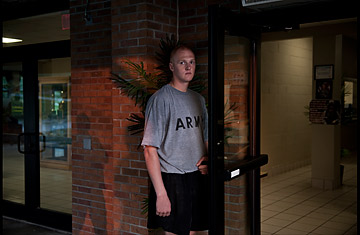
A recruit at Fort Jackson holds open the door to the mess hall during breakfast hours.
"I felt as alien here as I was in Iraq," the 32-year-old recalls of his return to his native Utah. At home, he says, it was impossible to tell we were a nation at war. He couldn't discuss it with pals "without sounding like a Martian," because they had no idea what the war in Iraq was like. The conversation would bog down, stall and then move on to other topics.
Lemons has moved on too, although his lingering PTSD and upcoming 14th operation on his feet, which were crushed during a fall in Najaf, are reminders of what separates him from most Americans. "The gap between the military and everybody else is getting worse because people don't know--and don't want to know--what you've been through," he says. "There are no bond drives. There are no tax hikes. There are no food drives or rubber drives ... It's hard not to think of my war as a bizarre camping trip that no one else went on."
As the nation prepares to welcome home some 45,000 troops from Iraq, most Americans have little or nothing in common with their experiences or the lives of the 1.4 million men and women in uniform. The past decade of war by volunteer soldiers, sailors, airmen and Marines has acted like a centrifuge, separating the nation's military from its citizens. Most Americans have not served in uniform, no longer have a parent who did and are unlikely to encourage their children to enlist.
Never has the U.S. public been so separate, so removed, so isolated from the people it pays to protect it.
Every day, U.S. troops fight and work on all seven continents, but in most ways the nation has moved on to new challenges: the economy and a looming presidential campaign in which the wars bump along at the bottom of a list of public concerns topped by jobs, debt, taxes and health care. Over the past generation, the world's lone superpower has created--and grown accustomed to--a permanent military caste, increasingly disconnected from U.S. society, waging decade-long wars in its name, no longer representative of or drawn from the citizenry as a whole. Think of the U.S. military as the Other 1%--some 2.4 million troops have fought in and around Afghanistan and Iraq since 9/11, exactly 1% of the 240 million Americans over 18. The U.S. Constitution calls on the people to provide for the common defense. But there is very little that is common about the way we defend ourselves in the 21st century.
The isolation will be plain to see as those U.S. troops in Iraq stream home before the year's end. Most will return not to 50 states but to two: North Carolina, home to the 82nd Airborne Division, and Texas, home to Killeen's Fort Hood and El Paso's Fort Bliss. There, many of them will live "on post," or in military-centric towns, where contact with the rest of us is rare. "As we continue to concentrate ourselves in fewer and fewer bases, as we become more secluded by way of a volunteer service, where fewer and fewer Americans have either served or know someone who's served," says Army Secretary John McHugh, "there is a sense of alienation that I don't think is positive."
